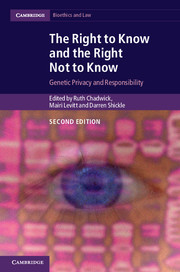Book contents
- Frontmatter
- Contents
- List of contributors
- Acknowledgements
- Introduction
- Part I Philosophical and legal issues
- Part II Issues in genetics
- Part III Emerging issues
- 9 The right to know and the right not to know in the era of neoliberal biopolitics and bioeconomy
- 10 The parental love argument against ‘designing’ babies: the harm in knowing that one has been selected or enhanced
- 11 The press and the public interest
- 12 The inescapability of knowing and inability to not know in the digital society
- 13 The food we eat: the right to be informed and the duty to inform
- Index
- References
12 - The inescapability of knowing and inability to not know in the digital society
Published online by Cambridge University Press: 05 September 2014
- Frontmatter
- Contents
- List of contributors
- Acknowledgements
- Introduction
- Part I Philosophical and legal issues
- Part II Issues in genetics
- Part III Emerging issues
- 9 The right to know and the right not to know in the era of neoliberal biopolitics and bioeconomy
- 10 The parental love argument against ‘designing’ babies: the harm in knowing that one has been selected or enhanced
- 11 The press and the public interest
- 12 The inescapability of knowing and inability to not know in the digital society
- 13 The food we eat: the right to be informed and the duty to inform
- Index
- References
Summary
Introduction
This chapter considers the notions of ‘knowing and not knowing’ and the ‘right’ either way in the context of knowledge produced in an era of information/scientific transparency, openness and ubiquity; knowledge co-production; and upstream science governance – characterizations perpetuated through the global proliferation of information communication technologies. The protagonist, or antagonist of discussion, is ‘dialogue’ and the two or multi-way conversations that exist between multifarious public constituents and constituencies through which information flows and knowledge emanates. Discussion focuses specifically on dialogue produced and reconstituted in online and/or digital realms and the notion of a polylogue – an infinitely populating lattice of informational conversants or carriers unimpeded by the fetters of geographical separation or time – so prodigious and diffuse and so successfully networked and recruited, that the individual is impotent to disengage from knowledge transactions. In this context the right to know or not to know is not only diminished but effectively neutralized. In this chapter the polylogue is approached, in the first instance, as an enabler of the public’s right to know but discussion moves on to consider how the digital society compromises, if not subjugates or entirely removes, the right of the citizen to choose not to know.
The public, science and policy
In the UK in the 1990s, the relationship between science, politics and the public was complicated by a series of embroilments involving the bovine spongiform encephalopathy (BSE) crisis; concerns over genetically modified (GM) crops; and measles, mumps and rubella (MMR) vaccinations. The 1990s also marked a shift in the conceptualization of the ‘public understanding of science’, moving from a focus on ‘understanding’ to ‘engagement’ (Bauer et al. 2007). A House of Lords deposition (2000) reported a ‘new mood for dialogue’ and an emergent discourse of ‘science and society’ where the public’s relationship with science was re-envisaged as less cursory and more confident and critical than had been previously courted. This transition marked the emanation of the public wanting not only to ask questions of science but ‘have their voices heard’ (Stilgoe and Wilsdon 2009: 20). In this evolving context, the public’s relationship with science reconfigured from passive recipients to active collaborators.
- Type
- Chapter
- Information
- The Right to Know and the Right Not to KnowGenetic Privacy and Responsibility, pp. 180 - 195Publisher: Cambridge University PressPrint publication year: 2014
References
- 1
- Cited by



